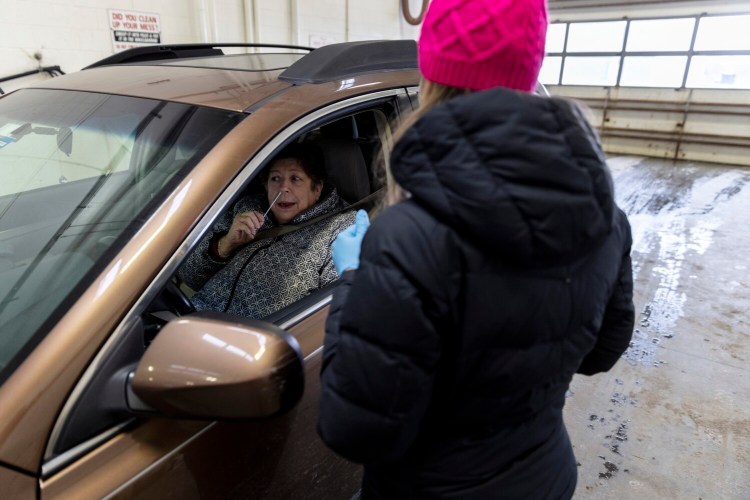COVID-19 hospitalizations dropped substantially on Wednesday, falling 5 percent in one day.
Hospitalizations declined from 319 on Tuesday to 304 on Wednesday. Although hospitals remain strained with historically high numbers of COVID-19 patients, total hospitalizations are now well below the Jan. 13 peak of 436, dropping 30 percent in less than a month.
The number of COVID-19 patients in critical care stood at 70 on Wednesday, a 47 percent decline from the pandemic peak of 133 on Dec. 19.
As the surge of cases driven by the omicron variant continues to subside nationwide, a growing number of states are announcing plans to rescind mask mandates, including requirements that masks be worn in public schools.
Massachusetts announced Wednesday that masking would become optional in schools starting Feb. 28, joining Connecticut. Vermont also is likely to make masking optional on Feb. 28 based on comments by Gov. Phil Scott. Other states, including California, New Jersey, Delaware and Oregon, are starting to make masking optional in schools, or telling parents when masks will become optional.
Maine does not have a statewide mask mandate, but most schools in Maine have imposed mandates based on the recommendation of the Maine Center for Disease Control and Prevention.
Dr. Nirav Shah, director of the Maine CDC, said Wednesday that there are no immediate plans to rescind that recommendation or set a date when it will be changed, noting that Maine’s mask recommendation is in line with the existing guidance from the U.S. CDC. Federal officials said this week that school masking guidelines remain in place, but indicated they could be revisited.
MEETING WITH SUPERINTENDENTS
Shah did say, however, that Maine CDC officials will meet with a group of school superintendents on Thursday and that the meeting will include a discussion about the state’s mask recommendation.
The meeting will include conversations “evaluating whether the (current) recommendations are appropriate based on how things are evolving in the pandemic,” Shah said.
As for giving schools a “date on the calendar” when the state would ease its masking recommendation, Shah seemed to discourage that idea. “I don’t know that for us right now putting a date on the calendar, or even thinking about it in terms of a date, is where we want to be,” Shah said.
CDC officials have met periodically with superintendents about school protocols. The Maine CDC recently ended contact tracing in schools after a discussion with superintendents about how ineffective the practice had become with the omicron variant.
The Maine CDC reported three additional deaths from COVID-19 on Wednesday and added 1,098 new confirmed cases to the pandemic total, although with a massive backlog to go through, the daily case counts are no longer an accurate measure of current pandemic conditions. Since the pandemic began, Maine has recorded 183,499 cases of COVID-19, and 1,819 deaths.
The daily rate of positive tests submitted to the Maine CDC shows a marked decline in virus transmission over the past three weeks, from a weekday average of 3,184 positive tests in mid January to a weekday average of 1,404 last week. Not all positive tests become confirmed cases, in part because some people are retested after being infected.
Expanded wastewater testing also is providing evidence of a decline in the omicron wave.
CDC REPORTS WASTEWATER RESULTS
This week, the Maine CDC website reported for the first time results of wastewater testing in a number of communities, including Portland, Bangor, Brunswick, Lewiston-Auburn, York and Augusta, among others.
Most are showing a decrease in virus prevalence, including a 27 percent drop at the Portland Water District’s East End sewage treatment plant in testing done on Feb. 2 compared to Jan. 31 results, and a 15 percent decline at the Westbrook plant during the same time frame.
Although hospitalizations have now fallen well below the January peak, hospitals are still struggling with large numbers of patients and staffing shortages caused by the omicron wave.
Gov. Janet Mills announced Tuesday that the Federal Emergency Management Agency has approved her request for federal COVID-19 Surge Response Teams to support medical staff at Northern Light Eastern Maine Medical Center in Bangor.
Beginning Feb. 18, two U.S. Department of Defense teams each consisting of 20 military medical personnel – including physicians, nurses, and respiratory technicians – will supplement staff at EMMC to provide care for those with COVID-19 and other serious medical issues, the governor’s announcement said. The teams will provide assistance through mid-March.
The new federal personnel will join members of the Maine Army National Guard deployed in non-clinical roles in hospitals across the state. The deployment of Guard members to hospitals is scheduled through Feb. 25.
FEMA also has sent Surge Response Teams to Central Maine Medical Center in Lewiston through March 2 and has agreed to a 30-day extension through Feb. 25 of the federal ambulance teams supporting Maine hospitals. Additional ambulance teams are helping Cary Medical Center in Caribou and other hospitals in Aroostook County.
On the vaccination front, 73 percent of Maine’s 1.3 million residents are considered fully vaccinated, while 44 percent have gotten a booster shot.
Copy the Story LinkSend questions/comments to the editors.




Success. Please wait for the page to reload. If the page does not reload within 5 seconds, please refresh the page.
Enter your email and password to access comments.
Hi, to comment on stories you must . This profile is in addition to your subscription and website login.
Already have a commenting profile? .
Invalid username/password.
Please check your email to confirm and complete your registration.
Only subscribers are eligible to post comments. Please subscribe or login first for digital access. Here’s why.
Use the form below to reset your password. When you've submitted your account email, we will send an email with a reset code.